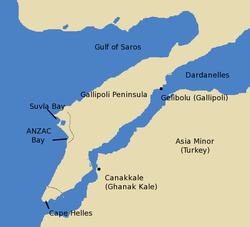Benutzer:S.T.E.F.A.N/And The Band Played Waltzing Matilda
| Dieser Artikel ist in Entstehung und noch nicht Bestandteil der freien Enzyklopädie Wikipedia.
Sollten Sie über eine Suchmaschine darauf gestoßen sein, bedenken Sie, dass der Text noch unvollständig ist und Fehler oder ungeprüfte Aussagen enthalten kann. Wenn Sie Fragen zu dem Thema haben, nehmen Sie am besten Kontakt mit S.T.E.F.A.N auf. |


And The Band Played Waltzing Matilda ist ein balladenhafter irisch- australischer Folksong von Eric Bogle aus dem Jahr 1972.
Das Antikriegslied handelt von einem jungen australischen Soldaten, der im Ersten Weltkrieg 1915 an der Schlacht von Gallipoli an den Dardanellen gegen die Mittelmächte und das Osmanische Reich teilnimmt und dort die Greuel des Krieges am eigenen Leib erfährt und zum Kriegsinvaliden wird.
Der Liedtitel nimmt Bezug auf Waltzing Matilda, Australiens bekanntestes Volkslied, das als inoffizielle australische Hymne gilt, und daher wohl von den Heeresmusikkapellen auf dem Weg nach Gallipoli gespielt wurde.
Inhalt[Bearbeiten | Quelltext bearbeiten]
Eingangs beschreibt ein junger AIF bzw. ANZAC- Soldat - wie er zum Kriegsdienst eingezogen und nach Gallipoli geschickt wird. Beim Ablegen des Schiffes spielt das Orchester dann Waltzing Matilda. Dann wird das Greuel des Krieges an sich, insbesondere des Ersten Weltkrieges und der Schlacht von Gallipoli beschrieben. In einem völlig entgrenzten exzessiven Gewaltszenario findet der junge Soldat sich wieder, und beschreibt es als "mad world of blood, death and fire" (engl.: durchgedrehte Welt, voll mit Blut, Tot, Feuer). Als Kriegsversehrter - ohne Beine, um je wieder mit Matilda (einem bestimmten australischem Tragebeutel) auf die Walz (auf Wanderschaft) zu gehen - kehrt er dann nach Australien zurück, um in der letzten Frage die Moral des Liedes aufzuzeigen: Auf einer der Militärparaden fragen ihn junge Leute, wofür er denn hier eigentlich marschiert; und er stellt sich dieselbe Frage.
Interpreten[Bearbeiten | Quelltext bearbeiten]
Zu den bekannesten Versionen dürften die von Joan Baez, sowie die der irischen Bands The Dubliners, The Clancy Brothers und The Pogues gehören.
Interessantes und Trivia[Bearbeiten | Quelltext bearbeiten]
- Einen kurzen Teil des Liedes über zitiert Bogle Text und Melodie von Waltzing Matilda
- In der zweiten Strophe spricht Bogle von der Landung in der Bucht von Suvla. Die Landung bei Suvla wurde aber allein von britischen Soldaten durchgeführt. Bogle selber erklärte es damit, dass die meisten Australier Suvla mit Gallipoli verknüpfen würden, und dass ihm das Wort den Reim darauf erleichtet hätte. Tatsächlich war das Zentrum der Aktivitäten der australischen Truppen in der jetzt so genannten „ANZAC Cove“ südlich von Suvla an der Westküste der Halbinsel Gallipoli. (Siehe Bild oben)
Text nach der Interpretation von Liam Clancy[Bearbeiten | Quelltext bearbeiten]
Now- when I was a young man I carried me pack
And I lived the free life of the rover
From the Murrays green basin to the dusty outback
I waltzed my Matilda all over
Then in nineteen fifteen my country said Son
It's time to stop rambling there's work to be done
So they gave me a tin hat and they gave me a gun
And they sent me away to the war.
And the band played Waltzing Matilda
As the ship pulled away from the quay
And admid all the tears the flag wave´n and cheers
We sailed off for Gallipoli.
Well I remember that terrible day
When our blood stained the sand and the water
And how in that hell that they called Suvla Bay
We were butchered like lambs at the slaughter.
Johnny Turk he was ready, and he primed himself well
He rained us with bullets, and he shout us with shells
And in five minutes flat Thai are all dblown to hell
Nearly blew us back home to Australia.
And the band played Waltzing Matilda
When we stopped to bury our slain
We buried ours and the Turks buried theirs
Then it started all over again.
Those who are living just try to survive
In that mad world of blood, death and fire
And for ten weary weeks I kept myself alive
But around me the corpses piled higher
Then a big Turkish shell knocked me arse over head
And when I awoke in me hospital bed
And saw what it had done, than I wished I where dead
I never knew there were worse things than dying.
For no more I'll go waltzing Matilda
All around the green bush far and near
For to hump tent and pegs, a man needs both legs
No more waltzing Matilda for me.
They collected the wounded, the cripples, the maimed
And they shipped us back home to Australia
The armless, the legless, the blind, the insane
Those proud wounded heroes of Suvla
And when the ship pulled into Circular Quay
I looked at the place where my legs used to be
And thank Christ there was no one there waiting for me
To grieve and to mourn and to pity.
And the band played Waltzing Matilda
As they carried us down the gangway
But nobody cheered, they just stood there and stared
Then Thai turned all their faces away.
So now every April I sit on me porch
And I watch the parade pass before me
And I see my old comrades, how proudly they march
Renewing their dreams of past glory
I see the old men all tired, stiff and sore
The weary old heroes of a forgotten war
And the young people ask: "What are they marching for?"
And I ask myself the same question.
And the band plays Waltzing Matilda
And the old men still answer the call
But as year follows year more old man disappeare
Some day no one will march there at all.
Waltzing Matilda, Waltzing Matilda
Who'll come a- waltzing Matilda with me
And their ghosts may be heard as they march by the billabong
Who'll come a- waltzing Matilda with me?